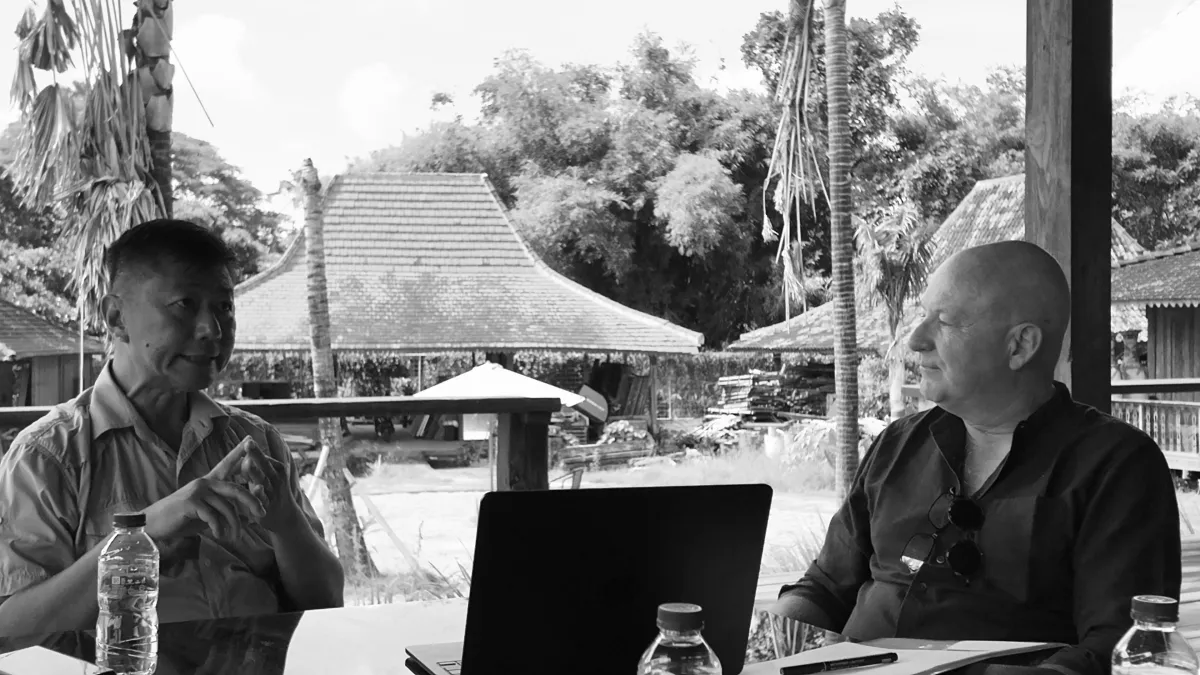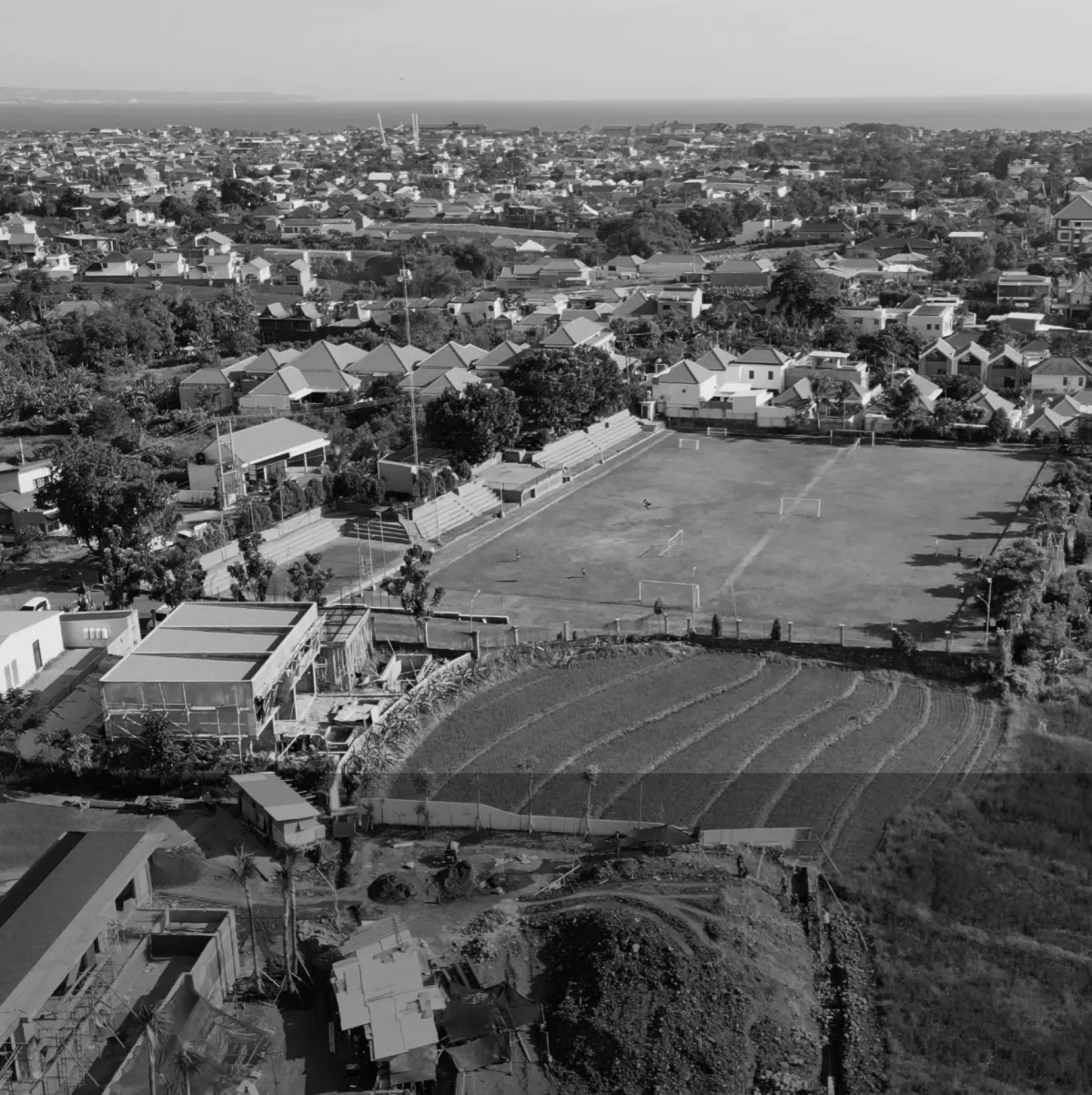THE 5 STEPS & 5 RED FLAGS
FOR WHEN BUYING LAND IN BALI.
Achieving world-class ROI while avoiding both the hype and the scams.
By Stefan Wetterholm, Founder of BaliLandList.com
Are you dreaming of developing land in Bali? Whether it's the allure of world-class Return on Investment (ROI), the rich Bali culture, or the stunning landscapes that draw you in, this article is for you!
Having witnessed countless investors come and go since 2015, I've distilled my experience to help you sidestep common pitfalls and achieve success.
Getting All the Facts Straight
No matter how seasoned you are, Bali's unique cultural and climatic landscape, combined with its emerging market vibe, can be overwhelming. Hearing about scams and inconsistencies only adds to the challenge of starting a development project.
Many people seek advice from cafes and online forums, often leading to misinformation. For instance, while some might say that foreigners cannot buy land in Indonesia, the reality is that you can—by setting up a PMA company and obtaining the appropriate HGB title .
Similarly, it's a myth that starting a PMA company requires a IDR 10 billion (USD 648,000) down payment. A reputable company agent can provide accurate guidance on how it actually works.
Stepping into the Investor Mindset
Dreaming is one thing, but preparation is key for peace of mind. Doing your homework will make the journey more enjoyable and less stressful.
Applying Strategic Thinking
Before diving into the complexities of laws, zoning, and company setups, focus on strategic thinking. Determine what’s crucial for your project and what can be addressed later. Start by outlining your project to gain confidence and make informed decisions as you search for land and engage with professionals.
To simplify your process, here are five key points to consider before getting lost in the details.
5 STEPS TO GET IT RIGHT.
1. Follow a proven process.
Following a proven process not only boosts your confidence but also ensures that you take the necessary steps in the correct order to avoid problems and prevent information overload.
Once you’ve identified the ideal land and decided on the best acquisition strategy, the general steps for securing the land are as follows:
A. Sign a Letter of Intent
Transfer a down payment to an escrow account managed by a notary. This agreement locks in the land and provides time for the notary or lawyer to conduct thorough due diligence. (Never make a down payment directly to the owner or agent.)
B. Conduct Due Diligence
This process verifies the true owner, the actual size of the land, and the official zoning, which determines what you can build. Thorough due diligence will also confirm that land taxes are paid up to the signing date, the land is fully paid for, and that there are no disputes.
C. Review Due Diligence Results
If the due diligence is ‘Clean & Clear,’ you will proceed to sign a Purchase or Lease Agreement at the notary office and transfer the agreed-upon sum. If the due diligence reveals issues, you may renegotiate the terms or choose to walk away from the deal, receiving a full refund of your down payment.
By adhering to these steps, you ensure a smoother and more secure land acquisition process.


2. Frame Your Project to Boost Confidence and Really Enjoying the Journey.
Before diving into the detailed planning of your development project, answering two key questions can significantly boost your confidence and make the development journey more relaxed and enjoyable.
Q1: Whom Are You Building For?
This question influences every aspect of your project, including the location you choose, your acquisition strategy, the quality of construction, your choice of architect, and your construction budget.
Q2: How Will You Sell or Rent Your Properties?
Understanding your marketing and sales channels, associated costs, proven results, and potential rental incomes will greatly enhance your confidence. This is especially true once you’ve optimized your project based on thorough research.
Addressing these questions will help frame your project effectively, setting you up for a successful and enjoyable development journey.
3. Do You Have the Necessary Funds or Financing in Place?
Many clients entering the property market often lack a preliminary budget when they start looking at land. Having a rough budget ready can significantly boost your confidence and expedite the process.
Land Cost:
Prices can vary widely depending on location, size, and your acquisition strategy. Consult a trusted agent to get an estimate for your initial budget.
Construction Costs:
The cost of construction can vary greatly based on the quality of the build. For an average construction project, estimate around $650 per square meter (approximately 10 million IDR).


4. Get a trusted Agent, Notary or Lawyer.
In Bali, most property listings are non-exclusive. Coupled with the low entry barriers for becoming an agent, this explains why there are hundreds of agents, each offering only a few listings, many of whom may lack experience in investments and land development.
It’s essential to find a trusted agent who can offer valuable advice and has the experience you need. Work with them to develop a plan for visiting various areas and plots to find the best fit for your project.
Once you’ve defined your target audience and the required building quality, selecting the right architect is crucial. Visit their previous projects to ensure they meet your quality standards. After choosing an architect, ask them to recommend reliable builders they have worked with before, ensuring you work with professionals who have a proven track record.
Additionally, speak with others who have built in Bali to gain further insights and perspective.
5. Now you can start looking for your land.
First, you need to choose the right area for your project. Depending on your goals, the ideal locations might include those suited for party tourism, eco-tourism, yoga retreats, or land investments with future potential.
To evaluate different areas more thoroughly, consider staying at a local guesthouse or hotel for a few days in each location to get a true sense of what works best for you.
Next, think about the type of view you want—whether it’s mountain, rice field, ocean view , or cliff or beachfront. Each option will impact both the profile of your project greatly and but also your budget.
When it comes to land size, it can be challenging to find the exact dimensions and shape that perfectly fit your project. In such cases, you might consider purchasing a smaller portion of a larger plot, allowing you to design your land usage to match your project needs and budget. This approach is known as ROI-optimization, where you only pay for the land you will actually use.

5 RED FLAGS TO LOOK OUT FOR.
1. “Under Market Price” – Really?
This is a common phrase in Bali, where many advertise properties as being "below market price." While it's true that some owners may need to sell quickly, who really wants to give away money that easily?
What they are actually reffering to is that the price is bellow the land tax price. Which has little to do with the market price even if it's supposed to reflect it.
Always compare the listed price with the market price in the area to determine if it’s legitimate or just a marketing tactic.


2. ROI “Going to the Moon”
Bali is renowned for its potential world-class return on investment (ROI). However, many companies and agents here promise specific future returns, which they obviously cannot guarantee (unless they provide it in writing). In most Western countries, it's illegal to promise a certain ROI on investments, simply because many factors can—and will—affect the outcome.
Don't get me wrong; ROI in Bali can be fantastic, but several factors come into play: location, the villa itself, what neighboring villas charge, agent fees, taxes, and more. Always do your due diligence!
3. Always check the land certificates
Most land comes with a certificate that indicates the registered owner, the approved zoning, and some building regulations. This certificate will be verified by the notary during the due diligence process.
However, the certificate could be outdated, with the owner or information differing from the official records. The registered owner may be deceased, with heirs not yet listed as owners. In cases where multiple siblings own the land, all must sign the agreement—not just one.
If the current owner acquired the land within the last 10 years, ensure they’ve fully paid for it. Always conduct a thorough due diligence.


4. Don’t use a Nominee.
In the past, people would acquire land or a villa by using a nominee, registering the property in a local’s name. Not only is this illegal, but it’s also the source of many stories where people lose their property when the nominee’s family needs money.
Today, the legal options are straightforward: either lease the land directly in your name, or buy or lease the land and register it under your own PMA company.
5. Never Pay the Owner or Agent Directly for Land.
Many people who lost money in Bali did so because they made direct payments without a clear paper trail. To avoid potential issues, it’s best to make all payments through a trusted notary, ensuring there is an official record of the transaction. This practice helps minimize the risk of wrongdoing.


Stefan Wetterholm is the founder of
www.BaliLandList.com
You are welcome to contact Stefan here:
[email protected]
WA + 62 823 40988 380
BaliLandList works in partnership with 500 landowners offering some 2,000 plots. The Hotlist: An online platform showcasing land up to 1,000m2, fully integrated with Google maps and Street View.